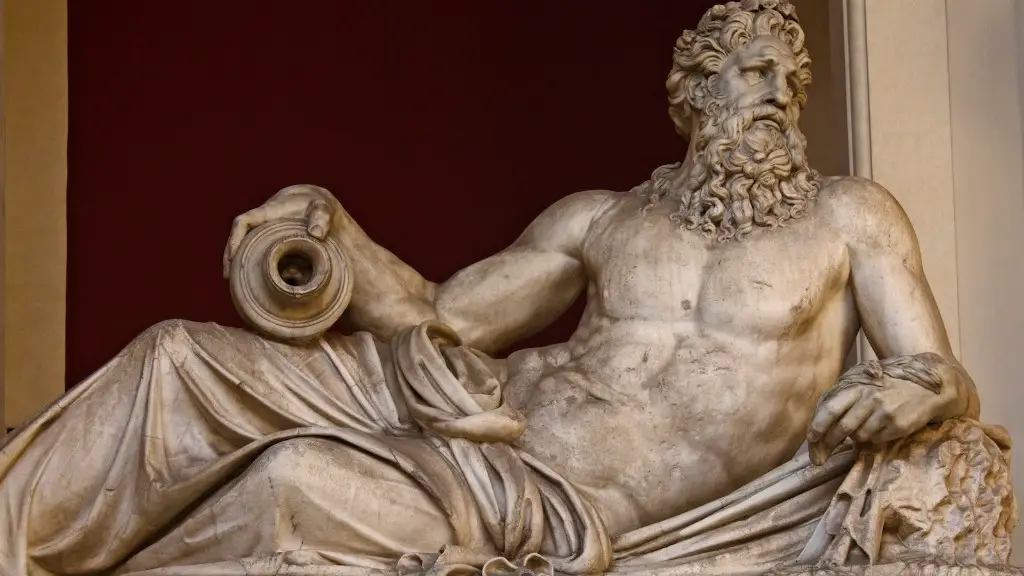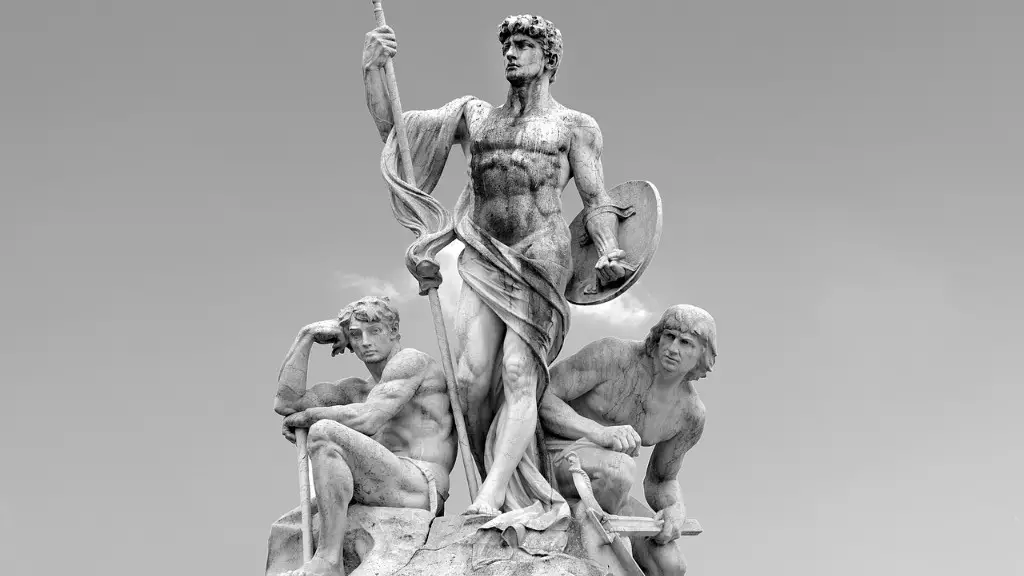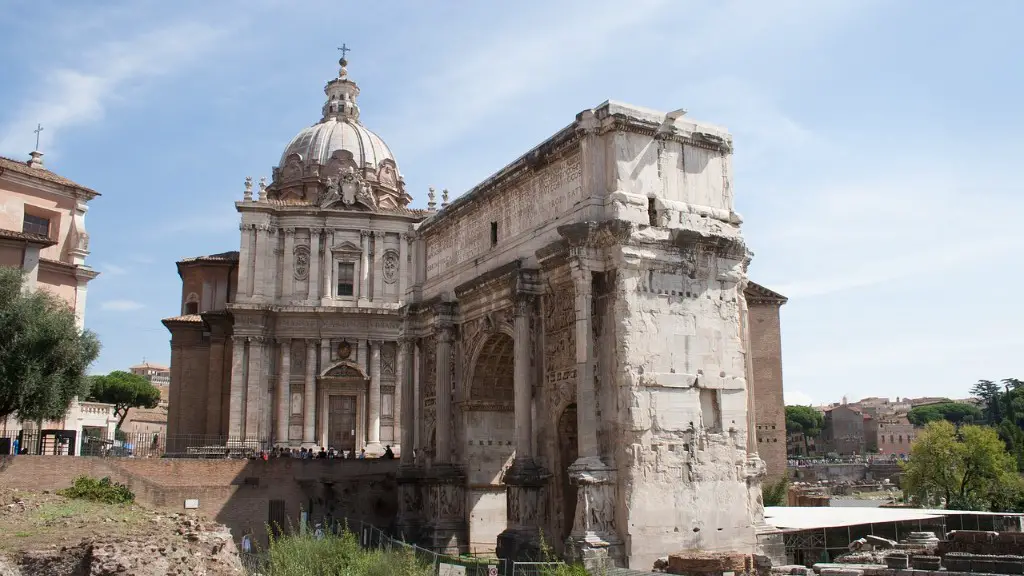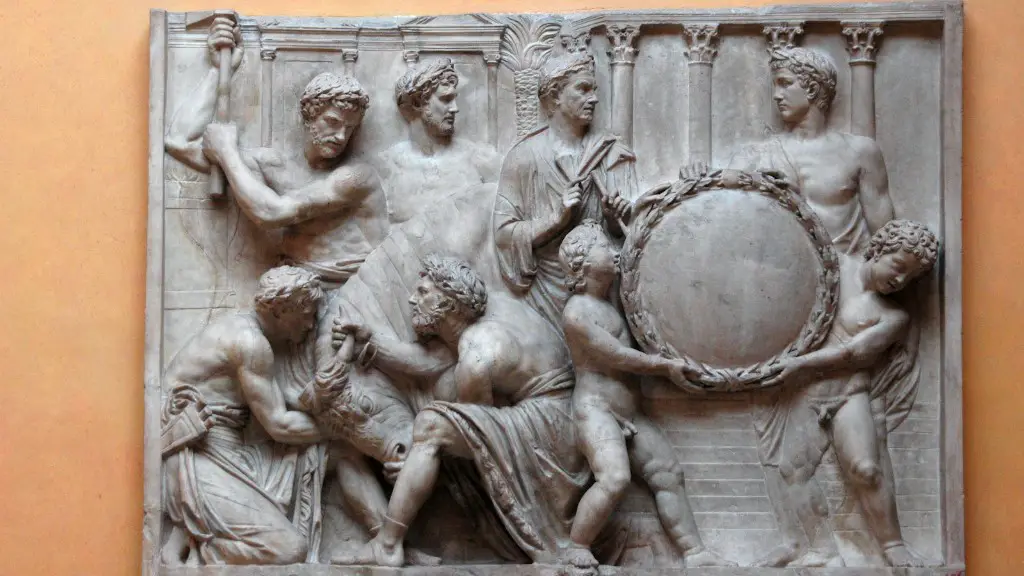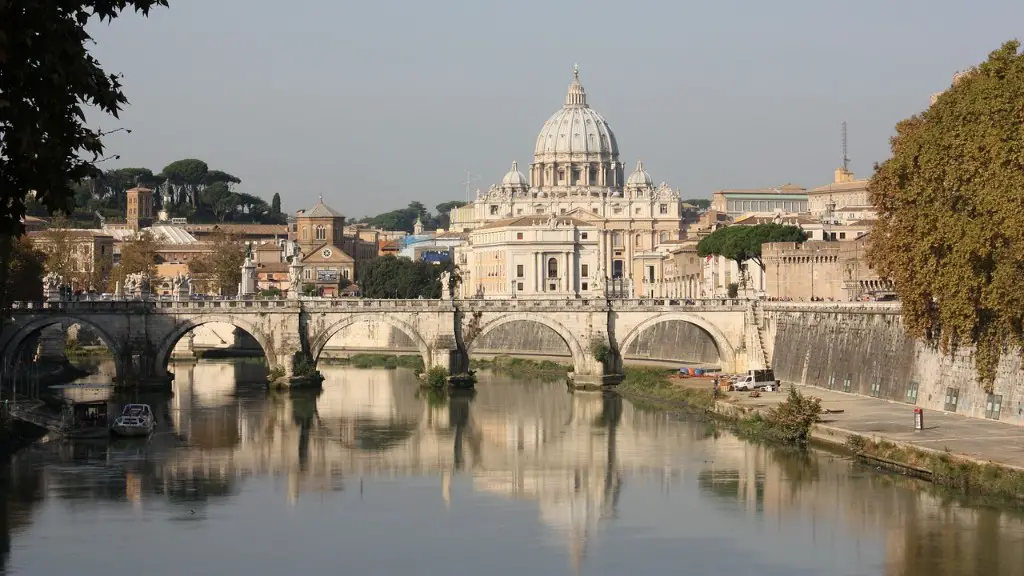In ancient Rome, public office was an honourable activity reserved for men of considerable wealth and high social rank. During the Republic, Roman citizens with full political rights, known as patricians, were eligible to stand for office and serve in the Roman Senate and other positions of political leadership. Later, in the imperial period, when Rome had become an empire, the emperor was able to appoint individuals to the most powerful positions in the Senate, thus allowing men from other backgrounds to hold office.
Holding public office was a complex process that required considerable wealth and political influence. In order to obtain a public office, an individual had to be able to demonstrate their commitment to Roman political ideals, a track record of service to the Roman state, and sufficient personal wealth to fund their office.
The most prestigious public offices in the Roman Republic were the two consulships, which were held jointly by two people, called the consuls. These individuals were elected by the Roman Assembly, a body made up of the notables of the state, including senators, former consuls, and financially established citizens. To be eligible for a consulship, a candidate had to have held other important public offices and be from a patrician family. In the imperial period, the emperor could appoint consuls, providing an opportunity for people from other backgrounds to rise to high office.
The Roman Republic also had many other political offices, some elected and some appointed. These included the office of praetor, which handled legal issues, and the office of aedile, which handled public works. In the imperial period, the emperor was able to appoint people to the most powerful positions in the Senate, such as the office of prefect, which oversaw the taxation system, and the office of quaestor, which oversaw the collection of state resources.
In order to hold public office in Rome, individuals needed not only financial resources, but also political support. Political support was traditionally sought from members of the Roman Senate, who typically had considerable influence over the appointment of new offices. While it was possible for individuals from non-patrician backgrounds to rise to political prominence with the help of the emperor, it was still necessary to have considerable personal wealth, political connections, and a good reputation in order to be eligible for office.
Finally, it was also important to have a good personal record, as public office in the Roman Republic was seen as a duty to the state and not as a way of gaining personal wealth or gain. Any public failure or scandal could lead to a swift and public removal from office, something that no public official wanted to endure.
Family
Family was an important factor when it came to holding public office in ancient Rome. Patricians were favoured in the appointment of public offices, as their wealth, power, and reputation gave them a head start when it came to the selection process. This meant that the political office was often filled by the same family members, which could lead to a situation in which the same individuals held office for several generations. This lead to a situation whereby the political structure of the Senate was dominated by a few powerful families, thus insulating them from competition from other potential candidates.
Moreover, as the family lines of patricians were often interlinked, the same individuals often held offices in different parts of the government simultaneously, leading to a situation in which certain individuals had a disproportionate amount of power. This system of government was often criticized by Roman citizens, as it meant that individuals outside of the powerful patrician families were largely excluded from the decision-making process.
Furthermore, it should be noted that the system of patronage was critical in the appointment of public office in Rome. Powerful individuals, such as senators, often had the ability to appoint individuals from their own families or from allied families to positions in the government. This allowed them to exercise greater control over the political process, as well as to ensure that their own families stayed in the political limelight.
Finally, it should be noted that the Roman Republic did not have a system of checks and balances, and as such, there were no effective means of preventing public corruption and malfeasance. This meant that, while there were some laws regulating the office of public officials, they did not have any guarantee of impartiality or enforcement. As such, influential patricians were often able to get away with criminal acts or other forms of nepotism and abuse of power, something which was highly detrimental to the functioning of the Republic.
Political Ability
Political ability was an important feature of those holding public office in ancient Rome. Those who wanted to be appointed to a public office had to demonstrate that they possessed the necessary skills to manage the office in question. This included the ability to make decisions, to think strategically, and to understand the complex political dynamics of the Roman Republic. Therefore, the individual had to demonstrate their political acumen in order to be considered for office.
Moreover, the Roman Republic also valued the individual’s ability to speak persuasively, as well as their ability to think critically. This meant that they had to be able to make a convincing argument in support of their political positions, and had to be able to see the consequences of their decisions. Those holding public office had to be politically savvy enough to survive in an often hostile political environment, and had to be capable of dealing with any challenges that arose.
It should also be noted that, in the imperial period, those holding public office in Rome were often appointed based on their loyalty to the emperor. This meant that they had to demonstrate their support of the emperor’s policies and decisions, or risk facing punishment or exile. This meant that, even if an individual was not particularly talented or politically savvy, they could still be appointed to a public office if they were willing to support the emperor.
Finally, it must be noted that, even if an individual was deemed to be politically capable, they still had to demonstrate their commitment to the Roman state and its ideals in order to hold office. This included demonstrating loyalty to the Republic, and a willingness to serve in an honourable and responsible manner. Those deemed to be unfaithful or corrupt were swiftly removed from office, thus ensuring that only those with true political talent remained in the positions of political power.
Accountability
Accountability was an important factor when it came to Roman public office. Those who held public office in the Roman Republic were expected to be respected and to act in an honourable manner in all of their actions. Any action that was deemed to be illegal or of a less-than-honourable nature could be subject to public criticism, and those holding public office in Rome were expected to be able to answer for their actions.
Furthermore, Roman public officials had to make sure that they complied with the law and acted in accordance with the principles of the Republic. This meant that any misconduct or illegal activities were subject to legal scrutiny, and any public officials found to be in breach of the law could face severe punishments, ranging from fines to imprisonment. In addition, Roman public officials had to demonstrate their ability to be held accountable for their actions, as their personal reputations were strongly linked to their ability to maintain a good public image.
Finally, it should be noted that Roman public officials had to demonstrate their commitment to the concepts of justice and fairness at all times. Roman citizens had the right to challenge any decision made by a public official, and any decision that was deemed to be illegal or oppressive could result in public censure and dismissal from office. This meant that Roman public officials were expected to act with fairness and impartiality, and any abuse of power could lead to severe consequences.
Public Opinion
Public opinion was also a critical factor when it came to hanging public office in ancient Rome. In order to be eligible for a public office, an individual had to be seen as an upstanding member of Roman society, and this meant that their personal reputation was always a major consideration. As such, those holding public office had to be careful to maintain a good public image and act in accordance with the values of the Roman Republic, or risk facing criticism from the Roman people.
Moreover, it was important for those holding public office in Rome to have the majority public opinion on their side. This meant that they had to demonstrate their commitment to Roman values and preserve the status quo, or risk facing a public backlash. This was especially important in the imperial period, when the emperor had the right to appoint public officeholders and could thus easily influence public opinion and shape public discourse.
Furthermore, public opinion could also influence which individuals were seen as fit for public office. Popular individuals with strong personal reputations were more likely to be appointed to public office, as their positive reputation could be used to the benefit of the Roman Republic. At the same time, those with a poor public image were likely to face exclusion from office, as their personal behaviour could be seen as a potential liability to the state.
Finally, it should be noted that public opinion also had an effect on the decisions made by those holding public office in Rome. Public opinion could be used to shape policy and influence the actions of public officials. As such, public officials had to take public opinion into account when making decisions, or risk facing a public backlash that could undermine their authority.
Conclusion
In conclusion, it can be seen that a considerable amount of factors had to be taken into account when it came to holding public office in ancient Rome. Patricians were favoured in the appointment of public offices, while in the imperial period, the emperor was able to appoint individuals to the most powerful positions in the Senate. Political ability and accountability were also important considerations, as those holding public office had to demonstrate that they possessed the necessary skills to manage their office and answer for their actions. Finally, public opinion was a critical factor, as those holding public office had to maintain a good public image and take public opinion into account when making decisions.
